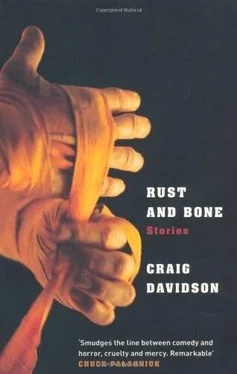The remaining five percent … those were interesting times.
He’d been slapped, punched, kicked, stabbed, smacked on the head with a blackthorn shillelagh. A .22 round lodged behind his left kneecap, a .40-caliber round stuck in his clavicle, ass and thighs pocked with rock-salt scars. He’d been bitten: dogs mostly, though once by an incensed deadbeat. In the late ’70s he repo’d a tractor left overnight in a fallow field. At the first rumble of that Cummins diesel engine the farmhouse lights snapped on. Moments later the screen door banged open and the entire family was racing at him like the hammers of hell. A man, a woman, two kids dressed in sleeping flannels. They carried shovels and mattocks and pitchforks; the woman hefted a wheat scythe that wouldn’t have looked out of place in the Grim Reaper’s skeletal hands. As he worked the clutch feverishly, Graham had a dim inkling of how Frankenstein’s monster must’ve felt, hounded by maddened villagers. The man hurled the pitchfork. A tine punched through the heel of Graham’s boot, severing some muscles and nerves. His limp was faint, but noticeable. Not bad for twenty-five years on smash-and-grab duty. A lot of repo men had caught worse.
He drove through the city’s industrial outskirts, past oil refineries surrounded by razor-wire fences and lit by a stargazer’s constellation of halogen bulbs. He merged with the Trans-Canada Highway, hooking around the city’s northern flank. Flat frost-white fields, fences, barns, the knuckled swells and dark contours of the distant hills beyond. Some feral creature—a coyote possibly, maybe a wolverine—slunk across the frozen fields. The Freightliner’s 8.8-liter diesel engine sent a steady vibration through the cab. Johnny Cash sang about Fulsom Prison blues. Cattle asleep in the pastures, plumes of steam puffing from their nostrils. A low autumn moon cast a burnt orange glow over oak and birch.
Any thrill associated with his profession had long since worn off. It was different when he was young. Back then, he had it down to a cold science: five seconds to slide a slimjim between the driver’s-side window and rubber lip, another five to pop the lock; thirty seconds to get at the ignition switch—he wore motorcycle boots with steel heels: one deft kick and the assembly snapped right off—another ten to jam a Phillips screwdriver down the ignition collar. In less than a minute any car in the city was his.
The tally of his repossessions over the years was impressive. ’82 Lamborghini Countache, midnight black, sticker price a quarter-mil. Vintage ’57 Chevy, candy-apple red with lozenge headlights, glasspack muffler, Great White tailfins. Many years ago, when they were dating, Graham flew Nell to Cape Cod to repossess a houseboat. They sailed it down through Bridgeport to New York, where Graham returned it to the dealership. Not just vehicles: coin collections and silverware, Royal Doulton figurines, a nineteenth-century Japanese musket. He’d shimmied up a rusted drainpipe to snare an antique weather vane in the shape of a codfish, hotwired a ’77 Harley Softtail in the parking lot of a biker bar, squeezed through a half-opened window to reclaim a funerary urn.
For a few soul-deadening months he’d repossessed medical equipment: electric wheelchairs and cases of dialysis mixture and sphygmomanometers. He even nicked some poor soul’s prosthetic arm. Nell was in and out of the hospital those days. The initial diagnosis was brain parasites: they were eating the lining of her brain so it pulled away from the inside of her skull, causing seizures. Graham suffered terrible nightmares: he found himself inside Nell’s head, shrunk to microscopic size on the teeming surface of a brain eaten away to the size of a chimpanzee’s by parasites—eight-legged tick-looking creatures with needlish mouths—and Graham powerless to stop them (this was better than the dream in which he himself was a parasite feasting on the jelly of his wife’s brain). The tests weren’t covered under their health plan, so Graham was forced into the ghoulish line of work to clear a few extra bucks. As soon as Nell was diagnosed with Bradykinesia, he begged off the assignment.
THE HOUSE WAS A DILAPIDATED BUNGALOW with an eccentric roofline, chipped marigold siding, front yard strewn with unraked leaves. The wooded cul-de-sac was located in a quiet neighborhood in the city’s north end. In the bordering yards, the outlines of bikes and skateboards could be seen under a powdery dusting of evening snow.
Graham backed up the narrow drive and killed the engine. He double-checked the reclamation papers, dimmed the domelight, grabbed his toolbox, and swung down from the cab.
The truck was a Dodge Ram dually, V-10 engine, chrome running boards and rollbar. Graham fished a set of keys from his pocket—no need for slimjims or coathangers these days; dealers kept key-casts for every vehicle sold—and unlocked the driver’s door. The steering wheel was bolted with a red Club lock. Graham rooted through the toolbox for the canister of Freon. He sprayed the assembly, enjoying the sound it made: rapidly freezing water. Frozen metal shattered with the tap of a hammer. After checking the VIN number on the dash, Graham keyed the ignition—a brief blast of Dwight Yoakam’s “Takes a Lot to Rock You” before he found the stereo’s volume knob—and, dropping into neutral, rolled the truck down the driveway until its rear wheels were set in the tow jack’s sling.
He’d nearly secured chains around the rear axle when a man stepped out the front door. The porch light was off and he moved silently, materializing from the spiderweb of shadows thrown by a leafless maple tree.
“What are you doing?” he said. “You’re … you’re thiefing my truck.”
Graham bent over his toolbox, grabbing the second canister he always carried: mace. Sometimes it was the calmest ones who ended up causing the most grief. He looked the guy over: short and thin with the sort of engorged belly Graham associated with starving Ethiopians, wearing a pair of camouflage pants and a T-shirt the vague color of boiled liver. His whole body was canted awkwardly to one side: right shoulder sagging, left shoulder hiked nearly level with his ear, the odd plane recalling a teeter-totter.
“I’m not stealing anything, and I’m sure you know that, Mister”— a quick glance at the reclamation papers—“Henreid. Do this quiet as I can, try not to wake the neighbors, okay?”
Henreid stood on the unkempt lawn, a sullen grimace stamped on his face. It never ceased to amaze Graham how people reacted: as though he were an agent of a shadowy agency whose heinous modus operandi was to bring misery upon hard-working, law-abiding, god-fearing folk. Surely Henreid knew this day was coming, unless he’d ignored the threatening letters and phone calls. He’d likely been expecting this for a while, but, true to the nature of such people, had hoped, with the unwarranted anticipation of a death-row inmate, to receive divine reprieve in the form of a bank error in his favor, an unexpected windfall bequeathed by a dead aunt, a butter-fingered clerk slopping coffee on his payment records, absolving all debt and responsibility.
“I’m only a month or so behind. Can’t you let it slide? I’m good for it.”
“I got no say in the matter. Sorry.”
Henreid disappeared inside. Graham crawled under the truck chassis, doubled the chain around the axle, clipped it to the sling. While he worked the winch motor, lifting the Dodge’s two-ton frame off its back wheels, Henreid reappeared with a child.
“Say hello to the nice man, Charity.”
The girl was dressed in a blowsy violet nightgown, protuberant belly swelling the fabric, rubbing sleep from her eyes. She looked at Graham and smiled, maybe because a child’s natural instinct was to do so, maybe at her father’s coaching. Her teeth were in awful condition: jagged and bucked, lapping one another like the shingles on a shaker roof. She was the kind of woebegone child one couldn’t help but forecast a grim future for—eating lunch on the schoolyard’s fringe, dateless on prom night—a girl earmarked for a lifetime of bitter experience, the inescapability of which enveloped her in a diffuse aura of melancholy.
Читать дальше












